Nine hours of almost undisturbed sleep later I awoke to the bing bong of the ‘nearly there breakfast announcement’ which gave us time for the first coffee and an amble up onto the top deck in the pre-dawn light to watch Gannets, Eiders, Guillemots and Razorbills in the harbour approaches and the first pied Tysties whizzed past the stern.
 |
| Lerwick |
We were off quickly and headed straight for the Fjara for our traditional full Scottish breakfast with the traditional Sassermeat and Black Pudding nestling amongst other meaty produce! Start as you mean to go on…
 |
| Turnstone |
 |
| Hooded Crow |
 |
| Gannet |
Gannets dived just outside the windows and there were
Turnstones and Hooded Crows on the rocks below.
With the weather blustery and threatening we opted for a mop up of the
birds already present around the middle section of Mainland and so made for
Wadbister Voe and the village of Girlsta to scan for the immature drake King
Eider. The light was in our faces but a
convenient cloud and the shelter of the fish hatchery allowed us to pick him up
as he bobbed along with a large flotilla of Common Eiders. He was basically brown with a paler breast
and an obvious orange bill. The rain returned and we swiftly moved on.
Great White Egret may now be an almost expected bird on a
day out down south now but ion Shetland it is still big news so it felt rude
not to drive by the one on the reedy end of the inland Sandwater. I will admit
to not giving it my full intention as it was a long way off and required a
slightly dodgy roadside stop but I could add it to me ‘Essence of Egret’
images…
 |
| Essence of Great White Egret |
From here we headed to Lower Voe where the heavens opened,
albeit briefly but between squalls we managed some excellent views of the
Red-breasted Flycatcher as it flicked around the Sycamores. Two Robins and two Redwings were in the
gardens and Grey Wagtail and Siskin called overhead.
 |
| Red-breasted Flycatcher |
The calm harbour was dotted with auks – mostly Razorbills
and all seemed to be in good condition and were actively catching small fish.
Fiver Mergansers and an immature male Goosander were joining in on the easy
food source and a couple of Grey Herons were feeding around the seaweedy edges.
 |
| Goosander |
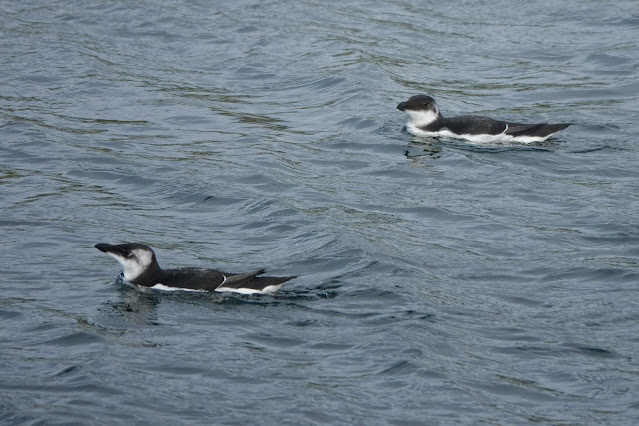 |
| Razorbills |
On again and over the top towards Aith – passing the Cake
Fridge of Happiness en route but of the first-winter Woodchat Shrike there was
no sign around its chosen gardens. Three Mealy Redpolls grovelled in the verge
along with a two Redwing before we decided to head for the Dinosaur Woodland
(as I call it) for a nose about. There
was a good flock of Chaffinches moving about but we could hear no Brambling –
but news that the shrike had finished digesting and was back out on show again
quickly drew us the short distance back down the road.
It was immediately on show and over the next half hour it
actively fed from the fence line, dashing to the ground to catch a snack. It was quite well advanced in plumage and
already had a ghosting of the ginger crown and nape.
 |
| Woodchat Shrike |
A Red-backed Shrike out on East Burra at Lochend was the
next and we soon saw this richly coloured juvenile feeding in the shelter of
the leeward side of the small plantation.
Unusually it seemed to prefer sitting up high on the dead snags to the
fence line but that could have been the presence of a few birders.
 |
| Red-backed Shrike |
 |
| Red-backed Shrike - Peter Moore |
A very vocal Pied Flycatcher came out on the front edge
occasionally and we were convinced that there was a rattling Red-breasted
Flycatcher in the too although we never saw it.
A Yellow-browed Warbler was also seen, often with the Pied Fly although
it only ever called once and Goldcrest, Song Thrush, Chaffinch and Brambling
were also lurking within.
 |
| Blackbird |
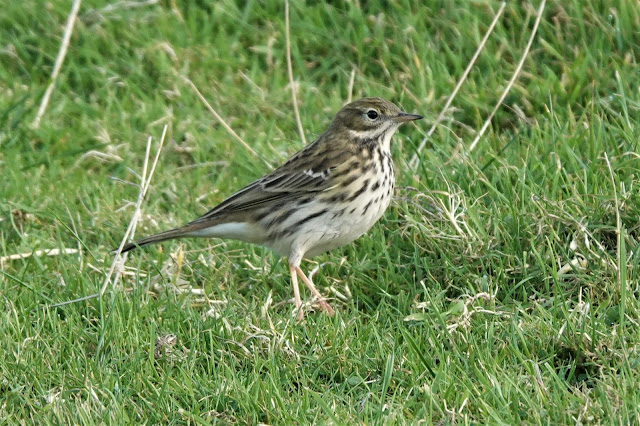 |
| Meadow Pipit |
A loud Redpoll call was heard and the bird dropped in front
of David and I. Bins up and a fluffy snowball of a Hornemann’s Arctic Redpoll
(or Horny ‘Poll as it is sometimes called) was in view. I called on the radio
for the others to come round and thankfully it stayed long enough for everyone
to get some good views as it moved through the Willows. It was a large, long Redpoll with startling
grey and white plumage and a warm apricot suffusion on the face and the
ubiquitous red forehead. The rump was
pure white and fluffy and this bird seemed to tick all the right boxes. A possible had been reported during the
morning so we were very pleased to nail it down for the original finders. All too soon it moved off up the track and
despite flying low we could not refind it.
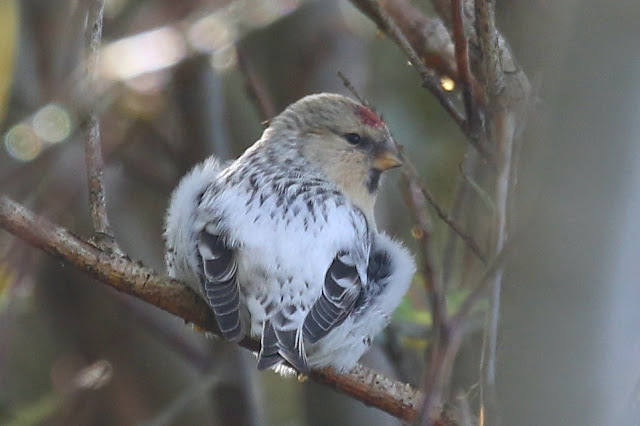 |
| Hornemann’s Arctic Redpoll - Pete's pic is superb but I had moved out of the way to let others see it by then |
An immature male Sparrowhawk hurtled into the canopy before scooting up the hillside to contemplate his next assault from a fence post. Down in the Voe there was a mass congregation of feeding Shags but we could only come up with inappropriate terminology for such a gathering…
 |
| Shags |
It was tempting to call it a day at this point and so we
made our way towards our digs at Hoswick, unloaded the car and were then
immediately lured back out after the still present Eastern Yellow Wagtail sent
us south to Noss, just up from RSPB Loch of Spiggie. Thankfully it was on show as soon as we
arrived as it tottered around the muddy farm tracks and damp run off field. A
darker more contrasting first-winter bird than the one on Unst in 2018 but
still in shades of grey and white with a slight bit of bill base colour. The short buzzy call was heard as it flitted
to and fro. As it happened this was its
last day.
 |
| The kitchen window view in Hoswick |
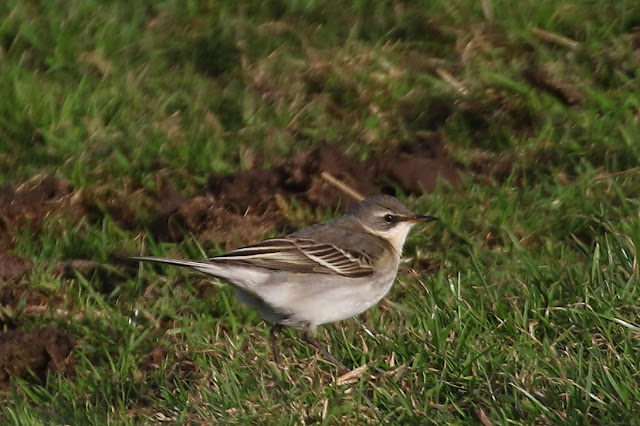 |
| Eastern Yellow Wagtail - Peter Moore |
The adjacent stubble field was full of birds with great
flocks of Starlings and Rock Doves, over 50 Skylark, six Pink-feet, 25 Mallard,
two Teal, Snipe, seven Wheatears, five White Wagtails, three Twite, five
Swallows and a lone Dunlin!
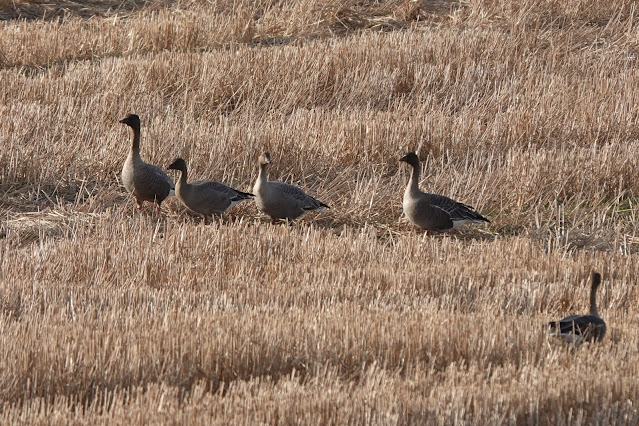 |
| Pink-footed Geese |
We retraced our steps back to Spiggie where 45 Whooper Swans
were present along with a small Wigeon flock and five Ringed Plover flew around
with some Snipe. A flock of 200 or so Golden
Plover were in the fields.
Our Hoswick bound direction did not last long as news of a Semi-palmated Sandpiper at Pool of Virkie had us dashing even further south and we were soon following the curve of the beach around to where the waders were roosting over the incoming tide. As it happened the bird had not been seen for twenty minutes but there were still a few nice waders to watch with 20 Dunlin, 14 Bar-tailed Godwits, 12 Knot and seven Ringed Plover. Wellies were helpful here and I suspect this may be the first twitch I have been to, where standing in the sea was beneficial.
A single Pale-bellied Brent Goose was a good find the bay
and a Shetland tick for most present. It was good to bump into friends and
catch up before ambling back to the cars where news broke that it was at the
other end of the bay on a tiny pool. Cue a mad dash to the end with Jono, Pete and I throwing ourselves into the back of the Disco Bus driven by Hawky and his posse of Shaun Boy, the Cowboy, Andy L, Blow Monkey and Bradders following on behind in the car but it flew off a few seconds too soon… oh well can’t win them all. The Brents had increased to six as we drove
back out.
It was time for Tesco shopping for dinners and such like and
a relaxing first evening in our twee cottage overlooking the bay as the wind
picked up and the overnight storm approached.

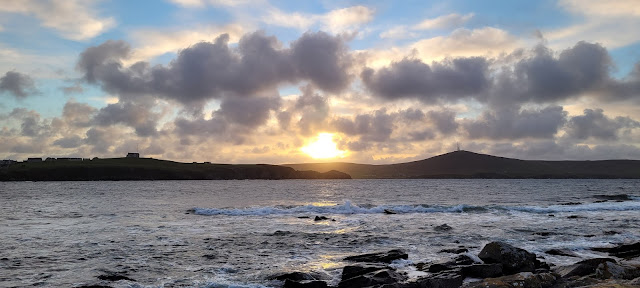
















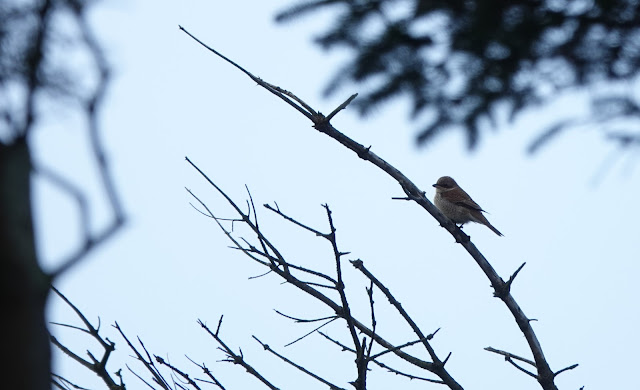












No comments:
Post a Comment